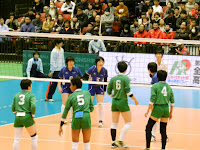This past winter, when I was working at three elementary schools in Ibaraki and spending my free time sending out resumes and cover letters to every half-decent open English Teacher position in Tokyo I could find, I got an interview with a private girls' school.
I took a train down to Tokyo on Friday night after work and spent the night in a small hostel. Then, Saturday morning, I changed into the most professional attire I could (black skirt with black stockings and kitten-heeled shoes, and a black Ann Taylor jacket over a white button-up shirt) and headed to the school.
The interview went well, I thought. They told me about the school, I told them about my experience in Taiwan and Ibaraki Prefecture. They asked questions, I answered, and vice versa. Then I left the school, left Tokyo, and went back to my life in Ibaraki.

On the Tuesday of that week, I had a free period during which I was utterly exhausted. To keep myself awake, I wrote. I wrote about job hunting, about how much I was afraid that moving to Tokyo wouldn't solve my problems of anxiety, constant emotional exhaustion, and (possible) bouts of Depression Lite, but how I desperately wanted the change, anyway. I wrote about the interview, and how intimidated I'd been by the prestige and professionalism of the school, by the implied workload and responsibility therein. "I kinda really want the position," I wrote, "even though it scares me shitless. It sounds like something I'd have to work really hard at. I hope I get it. I hope I kick all the other interviewees' butts and get an offer. I don't think I will, but I WANT to."
Long story short, I got the offer. I moved to Tokyo and started working at my new school.
The change in my disposition has been almost immediate. Even living in a tiny sharehouse room and commuting 40-ish minutes to and from work every day, I am definitely the most satisfied I have ever been at a job. I teach basic English classes but also advanced English via writing and computer skills. I'm a homeroom teacher and am responsible for a small class of determined and hard-working second-year high schoolers who deserve literally nothing less than 110% from me.
I finish my days exhausted and worn out, same as before, but the feeling is different. I like going to school, because I don't feel like an outsider. I go to the same school every day. I have co-workers I can really talk to, in English, and feel that I'm making a connection with them. Moreover, I work the same hours they do, so I feel like I'm part of the community.
I have my own
desk, one that isn't covered in random pamphlets or craft baskets or other school detritus when I come in for the morning because it isn't "that desk that the English Teacher uses sometimes," it's
my desk.
I have so much autonomy to plan my classes' curriculums and individual lessons that it made me panic a little during the first two weeks of school.
I go out on weekends and buy clothes for work that I like. Clothes I feel professional and stylish in. I don't automatically make a beeline for the discount rack, either. Since I'm not dancing around at work trying to keep small children entertained, I feel like I can buy clothes I care about that I won't sweat through and ruin in a month.
I'm looking for an apartment in Tokyo and I think this is the least concerned about moving costs that I've ever been in my entire life.
This year, I turn 30. It's a milestone. What I think is a bigger milestone, though, is that I feel like I've finally gotten to a place where I feel like a working professional instead of someone scrambling to acquire the ability and experience to be taken seriously. I feel like I'm finally in a job where I am not only expected to step up, I am being given the room to do it. I have a ton of responsibility and the weight of it is exciting and invigorating. I wake up each day and think, "I'm going to do my best." I have to be tough on myself because my students are depending on me to be the adult, and it's empowering. I like being in a place where I feel like the needs of the work will push me to evolve and grow as a teacher and a person.
It's only been a month and a half but I'm already really happy working here. I thought I would be, but I also thought there was a chance I wouldn't be, and I'm glad that it's turned out alright. I'm still not happy to wake up in the morning (I never am) but walking into school always fills me with a renewed sense of purpose. I have a job to do. I have responsibilities to fulfill. I have people counting on me. I have work that is meaningful, work that I am excited to do.
Next week is the start of exams. I am very stressed and often very tired. But I am happy. I very,
very rarely state that, because usually I am satisfied or content or fine with my life situation, but not
happy about the state of it overall. I like where I am, I like what I'm doing, I like who I'm working with and working
for, and I feel empowered to do my best at the tasks I'm given.
I am happy.






















